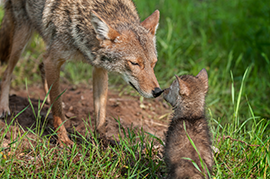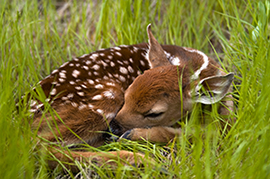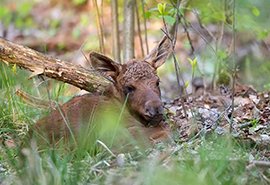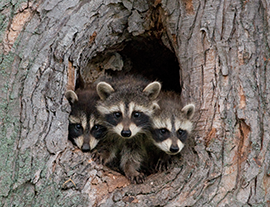Home → Fish & Wildlife → Wildlife → Living with Wildlife → Dealing with Orphaned or Injured Wildlife
Dealing with Orphaned, Sick, or Injured Wildlife

Maine is a beautiful state with an abundance of wildlife. Whether you are spending time in your backyard, hiking, driving down the road, or camping, you are likely to see some critters. After all, Maine is their home, too!
As a general rule, you should always watch wild animals from a distance and never feed or touch them. If you come across wildlife you think might be orphaned, sick, or injured, here’s what you can do:
I found young wildlife all alone
If you encounter wildlife anywhere in the Maine outdoors, remember this motto: If you care, leave them there. Wild animals and birds do not make good pets, and it’s against the law to possess them without the proper state and federal permits.
Picking up young wildlife might seem like the right thing to do; but in most cases, wildlife has a much better chance at survival when not disrupted by humans. Direct contact with wildlife can also expose you (or your family and pets) to a variety of diseases, and it can lead to an animal being euthanized in order to test for rabies.
If you care, leave them there.
Wildlife is very active during the late spring and summer – just like us!
If you encounter wildlife anywhere in the Maine outdoors, remember this motto: If you care, leave them there.
Is it orphaned?

If you’re out walking in a field, woodland area, or even your backyard, and you happen upon a baby fawn, moose calf, fox, raccoon, or other young wildling all by itself, you may worry that it has been abandoned by its mother. It probably hasn’t. The mother-young bond in mammals and birds is very strong; and most likely, mom is just out searching for food and will be back soon.
The best thing you can do if you come across a young animal or bird is leave it alone; and if you have pets, put them inside or on a leash. Picking up young wildlife might seem like the right thing to do; but in most cases, they have a much better chance at survival when not disrupted by humans or pets. Well-meaning people who take young animals out of the wild are actually harming the animals' chances of becoming normal adults. Animals that are taken by people and later released into the wild are at a disadvantage, as they lack the skills needed to find natural food and cover. Young wildlife cared for by humans often end up attached to people, with natural little fear. These animals sometimes end up wandering into populated areas, being attacked by domestic animals, being hit by cars, or even injuring people.
It’s against the law to possess wildlife without the proper state and federal permits, and for good reason: wild animals and birds do not make good pets; in fact, direct contact with wildlife can expose you to a variety of diseases, and can lead to an animal being euthanized in order to test for rabies or other harmful diseases. Young wildlife have specific nutritional requirements, so even temporary care to what you think is orphaned can be harmful to the animal. When well-intentioned people unnecessarily pick-up wildlife, it puts undue strain on rehabilitators who need to concentrate limited resources on truly orphaned or injured wildlife.
When you encounter specific species, here are some additional tips to keep in mind:

Fawns: It is always best to leave fawns alone, and you should never attempt to feed them under any circumstances. The nutrient profile of a mother’s milk enables a doe to leave her fawn for many hours while she feeds on her own to sustain the demands of nursing. Until the fawn is strong enough to keep up and come along, an adult doe may hide her fawn in the forest floor leaves, returning two or three times a day to nurse. During this time, the fawn is protected from predators by its camouflaged coat and its lack of scent. Repeated visits to a fawn can draw the attention of predators, and could discourage the mother from returning.
Learn how to determine if a deer fawn is truly orphaned.

Moose calves: Treat moose calves as you would fawns, but also be aware that approaching or handling a moose calf is likely to elicit a defensive response from a mother moose if it is nearby, and can lead to personal injury.

Squirrels or Raccoons: If a nest of squirrels or raccoons must be disturbed (for example, if a tree has been cut down or fallen), leave the young in the den part of the tree and move this part of the tree to a nearby protected place. The mother will most likely come back and transport them to a new location.

Birds: I Found a Baby Bird – Now What? (PDF) is a flow chart that can help you decide whether a baby bird needs rescue. If the youngster seems healthy and is in no immediate danger, you should attempt a family reunion. As shown in the flow chart, you can do this by placing the bird in a substitute nest. Unfortunately, these are not one-size-fits-all endeavors, as different kinds of birds prefer different types and locations (for example, parent birds from a cavity-nesting or ground-nesting species are unlikely to tend to offspring in a substitute nest hanging from a tree branch). If you need more help, try contacting Avian Haven at 207-382-6761.
If you have observed a young wild animal alone for more than 48 hours and believe it truly may be orphaned, please contact a MDIFW regional biologist or game warden to alert them. Do NOT move the animal unless directed to by a wildlife professional.
I saw wildlife I think might be sick
The Department manages for healthy wildlife populations; but some species, including raccoons, fox, skunk, and woodchucks are more susceptible to rabies and other diseases.
When you see an animal in the wild, it can sometimes be tricky to tell if what they’re doing is normal or a cause for concern (though most of the time, strange-seeming behaviors are just part of a healthy animal’s routine). The table below can help you differentiate between sick/strange and normal wildlife behaviors.
How to identify sick or strange-acting wild animals and when to seek assistance
Sick or strange wildlife behavior
- Spinning in circles, disoriented movement, falling over, unable to walk in a straight line, drooling or foaming at the mouth, and aggression towards people, domestic animals, or other objects
- No fear of people; repeatedly approaching people
- Unresponsiveness or lethargic temperament
- Slow movements, limp appearance
- Mucous discharge in the eyes and/or nose
- Tremors
- Chewing fits
- Skunk-like smell
- Face covered in porcupine quills

Please contact public safety for assistance if the animal is exhibiting the behavior(s) listed above:
- Augusta 1-800-452-4664
- Bangor 1-800-432-7381
- Houlton 1-800-924-2261
Normal wildlife behaviors or situations
- Patchy, thin, or mangey fur
- Traveling on three legs or favoring a leg
- Getting into a garden, compost pile, or bird feeder
- Living under a deck, porch, shed, or garage
- Acting defensive when cornered
- Protecting their den site or pups in spring and summer (specifically predators)
- Resting or hunting during the day in a yard, field, or meadow (any animal)
- Travelling, feeding, or hunting in full view during the day or night, even with pets and children in the area (specifically raccoon, fox, skunk or woodchuck)

There is no need to contact public safety. If you wish to prevent wildlife from coming to your backyard, learn how to remove common attractants. If you seek assistance, you may hire an Animal Damage Control (ADC) Agent.
I found injured wildlife
Often what humans perceive as an injury can be normal behavior, or the animal can heal on its own without human intervention.
In almost all cases, it’s best to leave wildlife alone and let them take care of their own injuries. Nature provides wildlife with the best options for survival and a better quality of life.
Every year wild animals are unnecessarily picked up by well-intentioned people and brought to wildlife rehabilitators or referred to game wardens. Unfortunately, most of these animals would have lived a normal life in the wild, but instead are subject to more stress, a decreased chance of survival, and may never be able to live in the wild again. There are a few circumstances where intervention may be justified, and when it is not justified, it puts undue strain on licensed wildlife rehabilitators who need to concentrate limited resources on truly orphaned or injured wildlife.
To determine if the animal is truly injured, look for these signs:
- The animal is unable to fly, stand, walk, or run when approached by a human.
- There is an obvious large wound (cuts, broken exposed bones, or bleeding).
- The animal has been attacked by a predator (dog, cat, another wild animal).
- You witnessed the animal being hit by a vehicle.
- The animal is vomiting or experiencing uncontrolled diarrhea.
- Heavy panting for an extended period of time.
Call first! Never handle or move wildlife unless directed to do so by a wildlife professional.
If you encounter a deer, bear, moose, or turkey, that exhibits the conditions listed above please contact a MDIFW biologist or game warden. For all other species, please contact local licensed wildlife rehabilitator or Animal Damage Control agent.
Find a local licensed wildlife rehabilitator:
| County | Name | Address | Phone | Facility | Other Info |
|---|---|---|---|---|---|
| Hancock | Acadia Wildlife Foundation - Ann Rivers | P.O. Box 207, Mount Desert, ME | 207-288-4960 | Kitteridge Brook Road, Mount Desert Island | small and certain medium mammals |
| Lincoln | Bridget Green | 611 Bath Road, Wiscasset, ME 04578 | 207-631-0874 | Fire Road 608 Approx 2 miles from downtown. Follow Rte. 1 South behind Green's gas station. Gray home back in the woods. | No birds. Small mammals, medium mammals and rabies vector species. |
| Oxford | Warren Brook Wildlife Rehabilitation - Jacqueline Fanning | 11 Baldpate Mountain Drive, Waterford, ME 04088 | 207-583-6266 | 11 Baldpate Mountain Drive in Waterford | No birds. Small Mammals, medium mammals and rabies vector species. |
| Oxford | Oxford Hills Veterinary Hospital - Matthew E. Holden D.V.M. | 136 Western Avenue, South Paris, ME 04281 | 207-743-9271 | 136 Western Avenue in South Paris | Oxford Hills Veterinary Hospital - Full service veterinary hospital. small mammals, medium mammals, passerines and other small birds |
| York | Elizabeth (Libby) Peck | 4 Wilderness Way, York, ME 03909 | 207-351-6752 | 4 Wilderness Way in York | No birds. Small and medium mammals. |
| Hancock | Critterville Wildlife - Susan Wotton | 1198 River Road, Bucksport, ME 04416 | 845-549-2407 | 1198 River Road, Bucksport, ME 04416 | Can take small and medium mammals, reptiles and deer. Will accept rabies vector species with the exception of bats. Cannot accept birds. |
| Kennebec Waldo | Avian Haven | 418 North Palermo Road, Freedom, ME 04941 | 207-382-6761 | 418 North Palermo Road, Freedom, ME 04941 | small raptors, large raptors, passerines and other small birds, waterbirds, turkey, reptiles |
| Cumberland | Kris Beaudoin | 320 Longhill Road, Sebago, ME 04029 | 207-807-1986 | 320 Longhill Road, Sebago, ME 04029 | small mammals, medium mammals and white-tailed deer fawns |
| Cumberland | Wendy Clark | 31 Woods Mill Road, East Baldwin, ME | 207-595-2140 | 31 Woods Mill Road, East Baldwin, ME | raccoons only |
| York | Bethany Brown | 238 River Road, Limington, ME | 207-420-7159 | 238 River Road, Limington, ME | bats, small mammals, medium mammals, Rabies Vector Species |
| Cumberland | Jessica Jackson | 207-807-2585 | small mammals & medium mammals including Rabies Vector Species | ||
| York | The Center for Wildlife | P.O. Box 620 | 207-361-1400 | 375 Mountain Road, Cape Neddick, ME | all birds, small mammals, medium mammals, bats, reptiles, amphibians. No rabies vector species other than bats. |
| Aroostook | Aroostook County Wildlife Rehabilitation - Cathy Coston | 480 Forest Avenue, Fort Fairfield, ME 04742 | 860-234-6908 | 480 Forest Avenue, Fort Fairfield, ME 04742 | can take small, medium mammals including rabies vector species |
| York | Pam McGuinness | 115 Melissa Drive, Yarmouth, ME | 207-233-9623 | 115 Melissa Drive, Yarmouth, ME | Small mammals - up to 10 gray squirrels only |
| Lincoln | The Turtle's Back, Inc. | Waldoboro ME | 203-903-2708 | Waldoboro ME. Contact for specific address. | Turtles |
| Waldo | Diane Winn & Marc Payne - Flight Plan Rehab | 251 North Palermo Road, Freedom, ME 04941 | 207-382-3013 | 251 North Palermo Road, Freedom, ME 04941 | Passerines and other small birds, reptiles & amphibians |
| Androscoggin | Skybird Wildlife Center - Tari Rowe | 696 Royalsborough Road, Durham, ME 04222 | 207-319-9300 | 696 Royalsborough Road, Durham, ME 04222 | Amphibians and Reptiles |
| Penobscot | Maine Wildlife Rehabilitation - Stephanie Lindsell | 1014 Bennoch Road, Old Town, ME 04468 | 207-814-8980 | 1014 Bennoch Road, Old Town, ME 04468 | Medium Mammals, Passerines and other small birds, Small Mammals, Small Raptors |